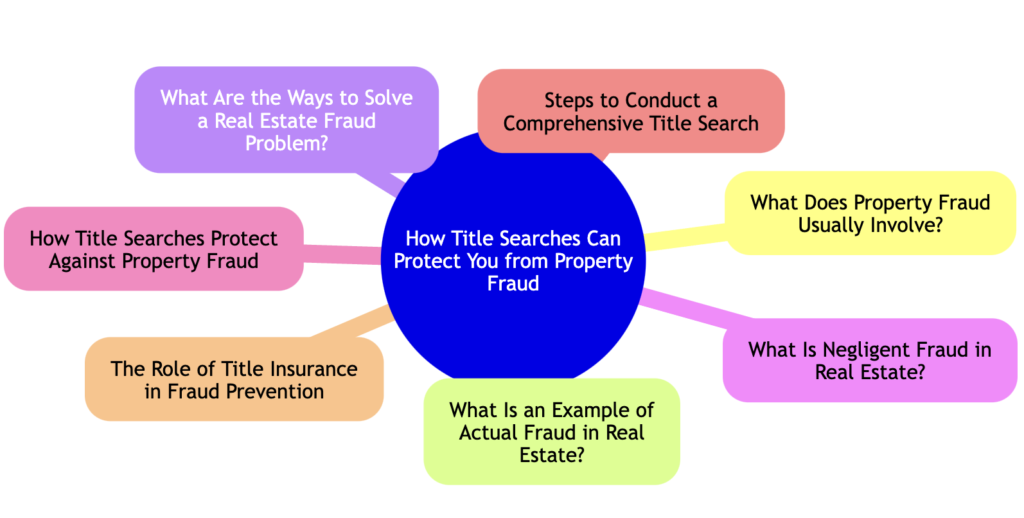Introduction: Steering Clear of Property Fraud
Title searches protect you from property fraud by verifying ownership, uncovering hidden issues like liens or forgery, and providing critical insights before finalizing any real estate transaction.
Partnering with an experienced professional like Title Search Direct minimizes the risk of unseen hurdles in real estate.
Key Takeaways:
- Title searches uncover hidden liens and encumbrances.
- They verify the legitimacy of property ownership.
- Title searches identify any existing easements or rights-of-way.
- They detect fraudulent activities, such as forged documents.
- Conducting a title search is a proactive measure to prevent property fraud.

What Does Property Fraud Usually Involve?
Property fraud is a broad term that covers several deceptive tactics aimed at unlawfully obtaining or profiting from real estate.
Fraudsters prey on unsuspecting individuals and institutions through deceptions like falsified documents or financial misrepresentation.
Property fraud can take many forms – but the common thread is the intention to deceive and illegally acquire property.
Here are the most common types of property fraud:
- Title fraud: Fraudsters forge documents, such as deeds, to transfer ownership without the rightful owner’s knowledge or consent.
- Mortgage fraud: Individuals or entities misrepresent financial information to obtain loans or mortgages they are not qualified for.
- Foreclosure scams: Criminals convince homeowners in financial distress to transfer ownership of their property under false pretenses, often claiming they can “help” them avoid foreclosure.
What Are the Ways to Solve a Real Estate Fraud Problem?
Real estate fraud is a serious issue that demands swift and decisive action.
Key Solutions to Real Estate Fraud:
- Legal recourse: Take legal action by filing a lawsuit to recover ownership and protect your rights.
- Title insurance claims: If you have title insurance, you can seek compensation for financial losses due to fraudulent transactions.
- Law enforcement involvement: Report the fraud to local authorities for investigation and possible criminal charges.
What Is Negligent Fraud in Real Estate?
Negligent fraud in real estate happens when a party makes false statements about a property – but not with malicious intent.
Instead, it occurs due to a lack of due diligence or carelessness in the process.
While the impact may be less intentional than other forms of fraud, it can still result in significant financial and legal issues for those involved.
Key Differences Between Negligent and Intentional Fraud:
- Negligent fraud: Involves false statements made without proper research or verification. It is often the result of oversight or ignorance rather than malicious intent.
- Intentional fraud: Is the deliberate act of deceiving others for personal gain, with a clear intent to cause harm or benefit unfairly.
How Title Searches Protect Against Property Fraud
Title searches are one of the most effective tools to combat property fraud.
A title search is a comprehensive review of the property’s legal history, and it plays a critical role in identifying potential fraud before it becomes an issue.
Title searches can stop fraudulent activity in its tracks by verifying key details and uncovering hidden risks.
Ways Title Searches Protect Against Fraud:
- Verifying ownership: Confirm the legitimacy of the seller’s ownership and their legal right to sell the property.
- Uncovering liens: Identify any unpaid debts or claims against the property that could create future legal complications.
- Detecting forgery: Reveal fraudulent documents, such as forged deeds or fake signatures, that could be used to transfer ownership without consent. (1)
Steps to Conduct a Comprehensive Title Search
Performing a thorough title search involves several key steps to ensure you uncover any potential issues.
You can identify any risks before moving forward with a real estate transaction by carefully examining public records and verifying the property’s legal history.
Steps to Conduct a Title Search:
- Examine public records: Review deeds, mortgages, and tax records to verify the property’s history.
- Check for liens: Look for any outstanding debts or claims that could impact your ownership rights.
- Assess easements: Determine whether third parties have any rights to use the property, which could affect its value or your ability to make changes.
- Verify legal descriptions: Ensure that property boundaries are correctly documented and match the physical land in question.
The Role of Title Insurance in Fraud Prevention
Title insurance protects property owners and buyers from financial losses caused by title defects or fraud.
It acts as a safeguard, covering legal fees, damages, and other costs associated with resolving ownership disputes.
With title insurance, you gain the confidence to move forward with real estate transactions – knowing that unforeseen issues won’t derail your investment.
End Notes: Safeguarding Your Property Through Title Searches
Fraud is a very real risk when buying real estate. Potential buyers must conduct a thorough property title search to minimize these risks.
At Title Search Direct, we specialize in delivering comprehensive title search services and expert support tailored to your needs.
Our team is here to help you move forward confidently in your property transactions. With Title Search Direct, nothing is left uncovered.
Learn more HERE.
Reference:
(1) Comply Advantage, What is Title Fraud?, https://complyadvantage.com/insights/what-is-title-fraud/





0 Comments